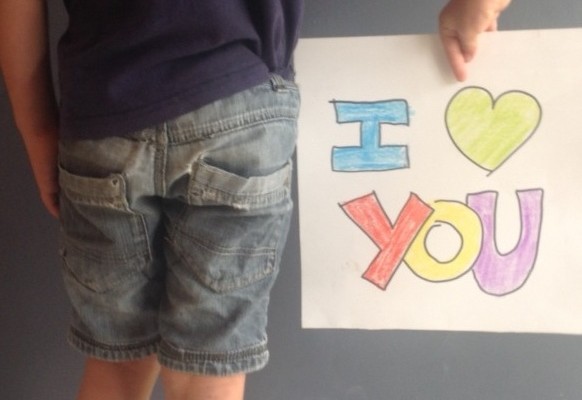
5 Questions to help you speak life-giving words to your child: What you say becomes their inner voice (pt 3)
I find it terrifying, but also dignifying, that I can shape who my child becomes – etching my influence and values into their deepest psyche.
In my last two posts (click here and here), I’ve shown that this is especially done through the words I speak or for that matter fail to speak. My words function as seeds, which very often take root and germinate in their own time – sometimes only decades later.
Years ago I discovered in biblical literature an axiom, a kind of North Star, to guide the words I speak to my kids: ‘Do not let any unwholesome talk come out of your mouths, but only what is helpful for building others up according to their needs, that it may benefit those who listen.’
Don’t beat up on yourself. I feel awful too when I re-read this. The unhelpful things I’ve said to my kids of late haunt me even as I write these words! But the encouraging thing about parenting is that we’re not just raising kids, we’re raising ourselves – to become better parents than the ones we started out as.
So let me get practical.
Here are five questions that guide Julie and I as we try speak helpful, life-giving words to each of our kids:
1. What should I stop saying to this child?
Before we take a look at some essential life-giving words our kids need to hear, let’s pull out any weeds we may be unwittingly planting. All too often, there’s weed-seeds mixed into the others that we sprinkle into their ears and upon their still-forming hearts.
Ask any shrink. They will tell you that much of their industry runs on the damage done in their client’s childhood years by parents who sowed the weeds of hyper-critical, careless or cutting words.
What are the words that you know you need to stop saying? Make a decision to never say them again – no matter how flustered, frustrated or fatigued you feel…
One possibly surprising set of words to be dropped from our vocab include, You’re making me angry or You’re making me sad. What’s wrong with this? It’s abdicating your self-leadership and placing a burden upon them that verges on psychological manipulation. Brenna Hicks says it like this: ‘When I was a child and fought with my younger brother, I would complain to my mom that he made me mad about something. She would respond with ‘No one can make you feel anything. You choose to get mad.’ At the time, I hated that phrase. However, it is very true. Parents tend to let their children control their emotions, when it is the parent who is ultimately responsible for how they feel. It is also important for kids to understand that they are not creating emotions in you. Instead of You’re making me mad! say, I need a break right now because I am getting upset or I am angry right now. You can communicate your feelings to your children without placing the burden of cause on them.’
2. What securing words does my child need to hear?
Our kids may be little in size compared to grown-ups, but their worlds are very, very big and their fears, anxieties and problems are just as real for them as ours are for us. With so much out of their control, and so many big emotions and situations to navigate, our kids all need our daily reassurance – words that can form a safe harbour and refuge from the unrelenting waves and storms of life.
Here are some words we use to anchor our kids from time to time…
‘Eli (7), you’re doing so well. I see you bravely going to school, making friends, eagerly learning new things. I see your patience with your siblings. I am so proud to be your parent. I love you no matter what. And I’m here for you.’
‘Fynn (5), you’re a happy, noisy, funny guy. And I love that about you. You fill our house with happiness. I like the way you ask questions, and the way your share. I know school without Eli there anymore is scary, but you’ve got what it takes. You’re doing great.’
‘Ivy (2), you’re the sweetest, and you’re so brave. My prized princess, you’re a lullaby of loveliness. You are taking your place in our family fantastically. So many boys, but just one girl – and you’re more than enough for the challenge. This family needs you.’
(Notice we stay away from blanket statements like, You are amazing / awesome / special. I will tell you why in a future post. Instead we verbalize 1) our commitment to them and 2) our appreciation for their unique qualities and contributions to family life.)
What does your child need to hear you say? How can you affirm their uniqueness, and allay some of their current fears and challenges?
3. What character-forming words does my child need to hear?
Most parents tend to over-address specific bad behaviours and under-address character weaknesses in our children. Focusing on bad behaviours is a short-term (albeit necessary) approach to parenting, and often is negative in tone (Stop hitting your sister). Focusing on character traits that have yet to develop in our kids is a longer-term strategy, and can be positive in tone (Treat everyone like you wish to be treated, my boy).
I suggest you write a list of the bad behaviours in your child, and then try group some of them to reveal a deeper underlying issue: their lack of character in a certain area. For example, where whining prevails, the deeper issue is a lack of robustness or gratitude. Where temper tantrums are the order of the day, the real issue is a lack of self-control. When kids tell lies, a lack of honesty is revealed.
Once one or two character flaws are identified, create or find a positive one-liner that expresses the positive character trait you wish to see in your child. Then sow it, and water it often. For example, of late Julie and I often say, Fynn, it’s better to be kind than king. (Character trait: kindness). Ivy, ask don’t demand – then say thank you. (Character trait: non-entitled gratitude).
Last night I camped with Eli at his school. I overheard a neighbouring tent-dwelling dad saying to his boy, Don’t say ‘I can’t’. Say ‘If I practice and practice, I can’. I plan on cutting and pasting that right into my parenting script for Eli, who also needs to develop the character trait of perseverance.
4. What interpretive words does my child need to hear?
When events unfold, a child’s mind reaches for an interpretation. In much the same way nature abhors a vacuum. But all too often, those interpretations are wrong, even destructive to the emotional health of our kids.
Think about the impact of your childhood upon your life now. Many of the inner voices that rattle around inside of us are not what our parents said, but because of what our parents didn’t say at a critical moment. Experiencing something difficult, we were left to our own inexperienced brains to interpret it – thereby generating our own, usually misguided inner voice. For example, we lost the race and left to ourselves, we thought, Losing is terrible, winning is everything. Or when our dog died, we said to ourselves, What’s the point of having an animal! And when our parents fought in front of us, then made up later that night while we were asleep, we thought Mommy and daddy don’t love each other anymore. And when our dad was angry, we thought, It’s all my fault.
Is there any hardship our child is experiencing now – at home, at school, in their friendships? How might they be wrongly interpreting it? What can you say that will fill that void with something more helpful?
Winning is fun, but it’s not everything!
Rather to have loved an animal and lost an animal than never have loved one at all.
Mommy and daddy love each other so much.
When I lose it, it’s never your fault!
5. Am I saying it enough?
After identifying the securing, character-forming and interpretive words that our child needs to hear, we then need to say them.
Again and again and again.
Here’s the guideline: Say it 10 times more than you think you need to.
There’s also something to be said for timing. Decide on the best times in the day or week to say these things to your children. For example, I find Eli most receptive to my input when I am driving him to school and we sit in the car for a few minutes outside his school before he climbs out, or at bed time, or on a devoted daddy-Eli adventure (which comes about every 4-6 weeks).
Recently Eli said, Mom I know you love me in the morning. But for some reason by the time it’s night, I don’t believe it anymore. It’s like a spell or a curse. It’s like the devil gets in my head.
It’s not hard to guess what Eli needs to hear, and how often we need to say it. I have discovered that if I pick Eli up, hold his chest to mine, and whisper I love you it goes deep in, the securing effects immediately evident in his face. Thank you daddy. Thank you, he whispers back.
On that note, there’s one more post in this series. Next week I will deal head on with arguably the most destructive words of all, I love you, but… I will suggest a strategy so simple, yet so powerful, that reverses whatever damage you have done or might have done with these words. We’ll catch up then.
Comments
Also published on Medium.




